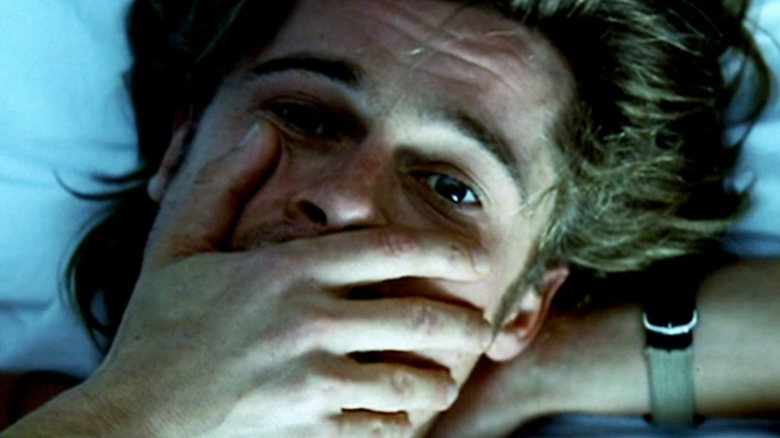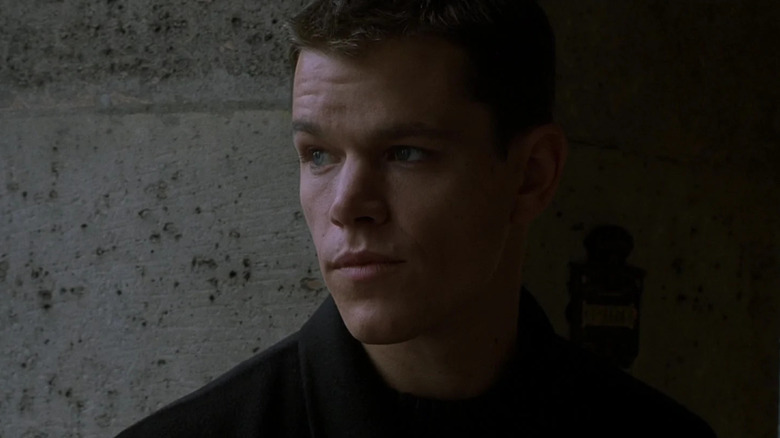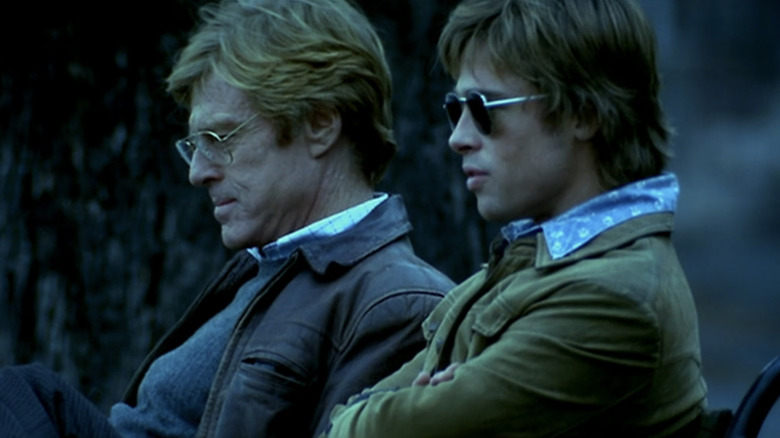Brad Pitt Turned Down A Massive Franchise To Star In A Mediocre Spy Movie
Without exactly repeating that famous William Goldman adage for the umpteenth time, it's basically a truism that in Hollywood, nobody knows what's going to work. That goes for actors as much as studio execs, as evidenced by the fact Will Smith turned down both "The Matrix" and "Inception" — the latter because he "didn't get it." Meanwhile, there are plenty of iconic horror roles actors regret turning down, and I'd imagine several of the actors who said "no" to the "Harry Potter" franchise probably felt a tinge of remorse.
Perhaps not quite as mortifying as Smith turning down two of the biggest sci-fi blockbusters of all time, but almost as frustrating, was Brad Pitt's decision to choose a particularly mediocre espionage actioner over what became a modern classic of a spy flick. Back in 2000, the actor was, according to Variety, offered the role of Jason Bourne in the seminal 2002 spy thriller "The Bourne Identity." The outlet reported at the time that Pitt was being "heavily wooed by Universal" for the movie, with the studio keen to launch a franchise based on the three Robert Ludlum books they'd acquired. As Variety noted, a franchise had at that point eluded Pitt, but as we all know, "The Bourne Identity" debuted two years later with Matt Damon in the lead role.
So, what happened? Well, it seems Pitt decided to go in a different direction. He stuck with the spy genre but accepted an offer for a very different film which absolutely did not spawn one of the most successful spy franchises of all time.
Brad Pitt said no to a big hit that changed action cinema
When "The Bourne Identity" debuted in 2002, it was like a reset for the action genre, which otherwise seemed to be flailing. Though "The Matrix" (sans Will Smith) had blown audiences' minds with its truly original action sequences, icons of the genre like James Bond still seemed to be struggling. "Die Another Day" also debuted in 2002, and there's a reason it's remembered as the worst Bond movie of all time. But "The Bourne Identity" delivered visceral, high-octane action that simultaneously felt grounded and believable. Soon, everybody in Hollywood was following suit, with the industry churning out grounded reboots left and right. Meanwhile, the Bourne saga produced two excellent sequels in the form of 2004's "The Bourne Supremacy" and 2007's "The Bourne Ultimatum," solidifying lead actor Matt Damon as not only one of Hollywood's biggest action heroes, but as a bankable A-lister in general.
Meanwhile, Brad Pitt had to watch from the sidelines (though he had a bigger role than Damon in the very successful "Ocean's Eleven" in 2001, which represented Pitt's biggest opening weekend at the time and which, wouldn't you know it, Bruce Willis regretted turning down). Still, the man could have done with another hit to follow that up, especially one that rewrote the rules of action cinema. According to Variety, Pitt didn't exactly turn down "The Bourne Identity," but rather, he committed to another movie and his schedule filled up, forcing him to pass on Bourne. Still, if he really wanted to play Jason Bourne, he could have said no to that other movie, and considering how it turned out in comparison to Damon's spy thriller, he probably should have.
Brad Pitt turned down The Bourne Identity for an OK Tony Scott spy thriller
To some a purveyor of schlocky spectacle, to others a consummate showman, Tony Scott directed some of the most propulsive and engaging action movies ever made. While "True Romance" always gets a mention, Scott's best film, and John David Washington's favorite Denzel Washington movie, was arguably "Man of Fire," which saw Denzel in one of his greatest action hero roles prior to leading the "Equalizer" franchise. 2001's "Spy Game," on the other hand, might not be remembered as the director's finest moment, but it certainly wasn't his worst. In fact, it seemed to define Scott more clearly than any other of his movies, in the sense that Michael Frost Beckner and David Arata's script was bonkers but somehow Scott made the final product watchable — a testament to the fact that style, rather than being the antithesis of substance, can often be its own kind of substance.
The film starred Robert Redford as Nathan Muir, a CIA agent on the brink of retirement when he learns his protégé, Tom Bishop (Brad Pitt), is being held captive in China on a charge of espionage. Muir hasn't seen Bishop for some time, having fallen out with his former mentee years earlier. But as memories of their time together come flooding back, Muir decides to embark on a mission to free Bishop.
Pitt, who'd starred in Redford's 1992 period drama "A River Runs Through It," evidently accepted the role of Bishop instead of committing to "The Bourne Identity," which of course looks crazy in hindsight, but there was no guarantee at the time that the Bourne saga would become the massive hit it did, and Pitt had been discussed as a golden boy in Hollywood in similar terms to Redford in his younger days, so there was a certain poetry in the two of them teaming up on screen. Still, it had to hurt a little to see how Matt Damon's franchise took off while "Spy Game" received middling reviews (the movie stands at 64% on Rotten Tomatoes) and made just $143 million on a $115 million budget. "The Bourne Identity," on the other hand, stands at a muscular 84% and made $214 million on a $60 million budget — to say nothing of the franchise it launched. Still, at least Pitt can say he didn't pass on "The Matrix" ... wait, scratch that — he did.


